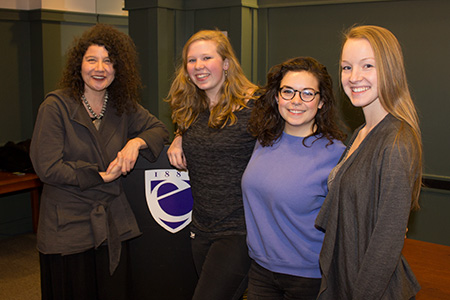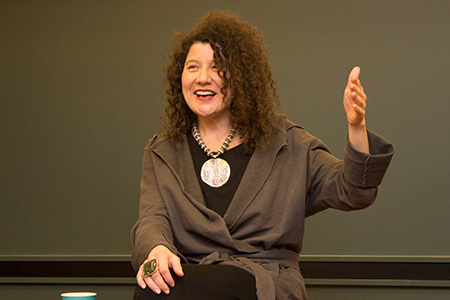Lewis ’92 promotes eating disorder awareness

Eating disorder counselor Karin Lewis ’92 with Active Minds members Ashley Cunningham ’16, Caitlin Bailey ’16, and Camra Godwin ’16, before her discussion in the Beard Room on February 24. (Photo by Dan O’Brien)
An alumna who survived an eating disorder and became a clinical director of a local treatment center spoke candidly with Emerson students on February 24 to better educate and raise awareness of such debilitating conditions.
“There should be no shame in talking about human suffering,” said Karin Lewis ’92, who recovered from anorexia nervosa nearly two decades ago, and is now clinical director at the Monte Nido treatment center in Medford, Massachusetts. “Unfortunately, human suffering is a reality of life, and there should be no shame around it.”
Lewis, who suffered osteopenia—an early stage of osteoporosis—as a result of her disorder, spoke to students in the Beard Room on behalf of Active Minds, a student organization dedicated to raising awareness of mental health issues.
“Even as president of Active Minds, before meeting Karin, I did not fully understand eating disorders,” said Ashley Cunningham ’16, the organization’s president. “Karin does a really great job of making all of this relatable.”
Lewis said her eating disorder was unleashed upon hearing the news that her mother was an alcoholic. However, Lewis said there were many “little traumas” throughout her life that led to her disorder.
“When there’s a big trauma, everybody knows about it,” she said. “If you broke your leg, everyone will see you’re in physical pain and ask if you’re all right.”

Karin Lewis ’92 shared personal stories about an eating disorder with students on February 24 in a discussion organized by Active Minds, a student organization dedicated to raising awareness of mental health issues. (Photo by Dan O’Brien)
Lewis cited many factors that led to her disorder, which included having an anxious personality, being embarrassed by her family’s status in an affluent town, and being sheltered and confused about sexuality.
“You’re life doesn’t have to be that bad,” she said. “It’s how your experiences resonate with you.”
Lewis said that by the time she began college, she was “a train wreck.”
“I thought everyone around me had the instruction book to life, and I had lost the book,” she said.
Lewis was attending Emerson when she learned her mother was an alcoholic, which came as she struggled to grapple with a confluence of other personal problems.
“Not everyone who has a parent who’s an alcoholic will have an eating disorder,” she said. “It was my personality trait that made me come undone.”
Lewis said that severely restricting her food intake initially had little to do with body image—it had more to do with control.
“I told myself, ‘I can’t control anything, but I can control this,’” she said, pointing to her midsection. “I can finally control something I’ve always wanted to do, which is lose 10 pounds.”
That desire manifested into an obsession—made worse in the beginning by positive comments about her appearance.
Lewis said thinking about her food and exercise habits “24 hours a day” distracted her from all the issues that caused her anxiety.
“It was not about food,” she said. “It was about the distraction.”
As Lewis’s weight plummeted, her hair began to fall out and she suffered stress fractures from loss of bone density—on top of other serious physical ailments.
Lewis ultimately went to treatment, which she called “grueling” but life saving, after being hospitalized because she collapsed. She was only diagnosed with anorexia nervosa after being admitted to the emergency room.
“It wasn’t a very well known disorder 25 years ago,” she said. “Everyone knew something was wrong, but they couldn’t put a word to it until I was hospitalized.”
Lewis said she’s not shy about sharing her story because she knows it will resonate with people.
She urged anyone who may have an eating disorder, or knows someone with such a condition, to, “talk…just talk.”
“Talk to someone who is going to honor what you have to say,” Lewis said. “Call a therapist. Call your counseling center. Or call me.
“Helping people with eating disorders is one of the things that helps me in my own recovery,” she said.
If you or someone you know suffers from an eating disorder, contact:
Emerson Wellness Center, 216 Tremont Street, Second Floor, Boston; 617-824-8595.
Karin Lewis, clinical director of Monte Nido Laurel Hill Inn, at Karin@montenido.com or 781-391-8000.
Eating Disorders Awareness and Prevention, Inc.
Categories